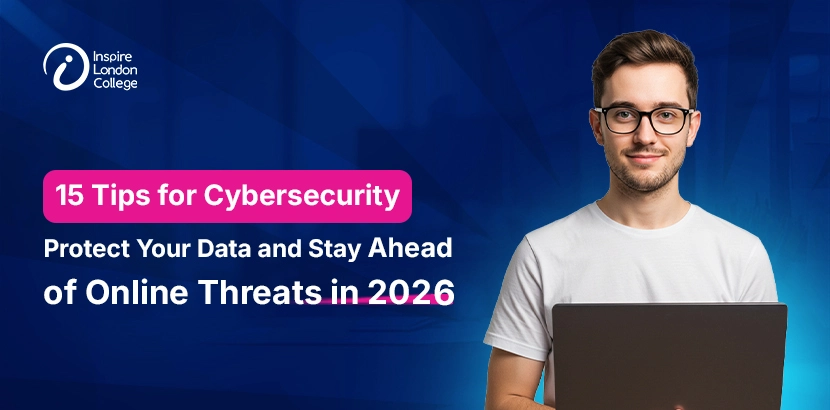Have you ever wondered how safe your personal data is in today’s digital world? Every swipe, click, or download you make could unknowingly expose you to smarter, faster, and more dangerous cyberthreats than ever. Shockingly, the 2025 Verizon Data Breach Investigations Report (DBIR) estimates that cybercrime will cost the world $10.5 trillion this year. So, that means you’re not just a bystander. You’re a prime target.
Cybercriminals use everything from phishing emails to malicious apps and sneaky malware to get what they want. Just look at what happened to Marks & Spencer in April 2025. Hackers gained access to internal systems, tricked employees using social engineering, and caused losses exceeding £30 million. Their online orders stopped, and contactless payments failed. The stock value dropped by £700 million. That wasn’t a tech glitch; it was human error. And that’s where you come in. Whether browsing from your phone or logging into work systems, your habits and awareness make all the difference.
In this article, you’ll discover 15 Tips for cybersecurity in 2026 and practical steps you can take right now to protect your data, outsmart online threats, and stay one step ahead.
Why is Cybersecurity Important in 2026?
Do you know that your digital presence is more valuable than ever before? From personal banking and social media to remote work systems and smart home devices, you’re connected 24/7. That constant connection creates opportunities but also opens digital doors to cybercriminals.
In 2026, the stakes are even higher. The digital world is a battleground due to AI-driven cyberattacks, data breaches from IoT devices with inadequate security, and increasingly cunning phishing schemes. Cybersecurity isn’t just a tech issue anymore; it’s the need of the time. And that is why data protection is essential in today’s digital world.
How Can We Protect Against Online Threats?
So, how can you shield yourself against these growing threats? You might think you’re safe online just because you’ve got a password. But the bad news is that passwords are no longer sufficient. Online threats are growing faster than ever, and cybercriminals are getting smarter by the second.
Every time you scroll through social media, check your emails, or even shop online, you’re exposed. Hackers are not only targeting large corporations; they are also targeting individuals. A study from the University of Maryland’s A. James Clark School of Engineering reveals that cyberattacks occur at an alarming rate of over 2,200 times daily, with someone falling victim every 39 seconds. Shocking, right? But you can stay ahead; the first step is to make all the necessary updates. Yes, those annoying pop-ups asking you to update your software matter. Developers fix security flaws with each update; if you ignore them, your system becomes vulnerable.
Also, your social media use might put you in danger. Be cautious when disclosing personal information, such as your birthday, name, email address, pet’s name, or favourite colour. Hackers utilise your personal data to guess passwords or deceive you with customised scams.
So, what you can do right now is to start with these simple but powerful habits. First, update regularly, use strong passwords, turn on 2FA, and stay cautious online. Install antivirus software and exercise caution when viewing your screen. The internet’s not going anywhere; neither are the threats. But with the right actions, you can take control and stay one step ahead.
15 Tips for cybersecurity in 2026
Cybercriminals aren’t slowing down in 2026; they’re getting faster, smarter, and harder to detect. If you want to protect your data and stay ahead, these 15 cybersecurity tips are your first line of defence.
1. Use Strong, Unique Passwords
Are your passwords still “123456” or “password”? Shockingly, those remain the most commonly used. In 2026, you must use long, complex, and unique passwords for every account. Use a password manager to help you store and generate strong credentials effortlessly. Also, you should avoid using the same password across multiple accounts.
2. Enable Multi-factor Authentication (MFA)
Shockingly, MFA can stop up to 99.9% of automated attacks. So, don’t just rely on passwords. Multi-factor authentication adds an extra layer of protection, like a code sent to your phone or email. Even if hackers get your password, MFA stops them from accessing your data.
3. Beware of Phishing Attacks
Have you ever clicked on a link that seemed legitimate but wasn’t? Probably, it happened to most of us. Today’s cybercriminals are creating AI-generated phishing emails that are nearly impossible to spot at first glance. They mimic the logos, language, and even the tone of people you know. That’s why you need to stay alert.
Always inspect URLs closely; just one wrong letter can send you to a fake site designed to steal your data. Never download attachments or open links from unexpected messages, even if they seem to come from friends or coworkers. When in doubt, verify. A quick call or message can save you from a major security breach.
4. Protect Your Devices and Data
When it comes to protecting yourself against online threats, you need to secure your devices like your data depends on it, because it does. Your phone, laptop, or tablet isn’t just a gadget. It’s a storehouse of private information, including work files, bank account information, pictures, and messages. And yes, cybercriminals know it.
Protecting your devices is just as important as guarding your online accounts. The best solution is to enable the remote wipe feature. So, if your device is lost or stolen, you can erase your data instantly and keep your operating system and apps up to date. Those updates often fix security gaps hackers love to exploit.
Don’t forget to use strong screen locks, avoid leaving your devices unattended, and encrypt sensitive data whenever possible. It’s not about being paranoid; it’s about being prepared. Because once your device is in the wrong hands, it’s not just a screen someone’s holding, it’s your digital life.
5. Keep Software Updated
When was the last time you updated your apps or system? Outdated software is a playground for hackers. Keeping your apps and systems up to date helps you reduce the risk of cyberattacks and ensures you’re always benefiting from technologies. So, ensure your software, operating systems, and applications are regularly updated. Enable auto updates so that your devices automatically receive the latest security patches.
6. Install Antivirus Software
Still think antivirus software is optional? Then you might be thinking wrong. Hackers can attack your systems and network through various methods, such as spyware, phishing attacks, malware, viruses, trojans, etc., to gain access to your data. Therefore, the best advice is to use reliable antivirus and anti-malware software to stop threats before they get to you. Do routine scans rather than waiting for an issue to arise.
The majority of people overlook the fact that antivirus software is not all created equal. Some people simply recognise dangers. Even after an attack, the best ones help you maintain control, clean your system, and return it to a safe state.
7. Email Security Protocols
Do you scan your emails before opening them? Email remains one of the top gateways hackers use to break in. Avoid clicking on links or downloading files unless you’re 100% sure they’re legit. Always verify the sender’s address; does it look genuine? Don’t click anything unless you’re completely sure it’s safe.
8. Encrypted Sensitive Data
You cannot overlook the importance of encrypting your sensitive data in order to defend yourself against online threats. But what exactly does encryption do for you? Encryption scrambles your information so only you, or someone with the key, can read it. Imagine locking your most private files inside a safe you can open. Sounds smart, right?
Do you store passwords, financial information, or personal documents on your device? Without encryption, hackers can grab that data easily if they get in. According to cybersecurity experts, encrypted data reduces the chance of identity theft and fraud. Many apps and devices offer built-in encryption; so, turn it on. Use encrypted messaging apps for private conversations.
9. Backup Data Regularly
When was the last time you backed up your data? What happens if ransomware locks your files or your device crashes? Without a backup, you could lose everything.
Backing up your data regularly means creating a safety net for your most important information, including photos, documents, work files, and more. Cyberattacks aren’t just about stealing data; sometimes they erase it. Did you know that 60% of small businesses that lose data never recover?
So, make it a habit to back up your data daily, weekly, or at least monthly. Use external drives or secure cloud services. Test your backups occasionally to make sure they work when you need them.
10. Limit User Privileges
Giving everyone full access might seem easier, but it’s a big risk. Hackers have more opportunities when an excessive number of people or even apps have unrestricted access. Over 70% of data breaches happen because someone has more access than necessary. So, how can you control this? Only grant access to people or programs that need it. Use the principle of least privilege, meaning limit permissions to the minimum required to get the job done.
11. Security Audits
Security audits help you find weak spots before hackers do. Do you know which parts of your system are most vulnerable? Regularly reviewing your security settings uncovers gaps that could invite cyberattacks. Companies that conduct frequent security audits reduce breach risks by up to 50%. You don’t need to be a tech expert; many tools guide you through the process, or you can get help from a trusted professional. Make a habit of auditing your passwords, software settings, and user permissions.
Taking control with regular security audits is one of the smartest ways to protect yourself against online threats. Don’t wait until something goes wrong; spot the risks now and stay secure.
12. Use Firewalls
Do you know what stands between your devices and cybercriminals? A firewall acts like a gatekeeper, blocking unwanted traffic before it reaches you. Without a firewall, hackers can sneak in through open ports and vulnerabilities. Are your devices protected with a firewall? Studies show that systems with active firewalls face far fewer attacks and breaches.
Firewalls are network security products that monitor or filter internal or outgoing network traffic according to an organisation’s security policies. Once your firewall is installed, remember to keep it up-to-date. Check regularly that it has any latest updates for software or firmware. You can also use hardware firewalls for extra security.
13. Internet of Things
How many smart devices do you have at home, including your thermostat, doorbell, and refrigerator? The Internet of Things (IoT) connects everything but presents new opportunities for cybercriminals. Did you know that hackers target poorly secured IoT devices to gain access to your entire network? So, taking accurate measures to protect these devices is pretty important.
Change your default passwords immediately, update their software on a regular basis, and restrict their access to your main network. Protecting yourself against online threats means thinking beyond computers and phones. Every smart device in your home needs protection because one weak link can put your entire digital world at risk.
14. Beware of Public WiFi
Public networks may appear convenient, but they frequently expose your information to cybersnoopers. Hackers can easily intercept your activity on unsecured networks, stealing passwords, reading messages, and even hijacking accounts. Shocking, right? Yet millions still connect without thinking twice. Want to stay protected? Use a Virtual Private Network (VPN). It encrypts your internet traffic and hides your location, even on risky public Wi-Fi.
15. Create a Cyber Emergency Plan
What would you do if your data were suddenly locked, stolen, or leaked? A cyberattack can happen at any moment. Do you have a plan that keeps you calm and in command? Do you have a step-by-step response ready? An incident response plan helps you act fast, isolating threats, restoring data, and minimising damage. According to the Ponemon Institute, 28% of organisations recover data faster when robust training programmes are implemented to inform employees about potential scams. You don’t need a tech team to start. Outline who handles what, how to communicate, and where to get help.
Final Thoughts
Cybersecurity in 2026 isn’t about fear; it’s about empowerment. You have the tools, the knowledge, and suggestions to stay one step ahead of cybercriminals. With these 15 tips for cybersecurity in 2026, you can confidently protect your data and stay safe in an increasingly connected world. The internet is flooded with malware, suspected links, trojans, etc., which makes the above tips even more important. So, safeguard your system against cyber threats with the help of the above tips and best practices.









